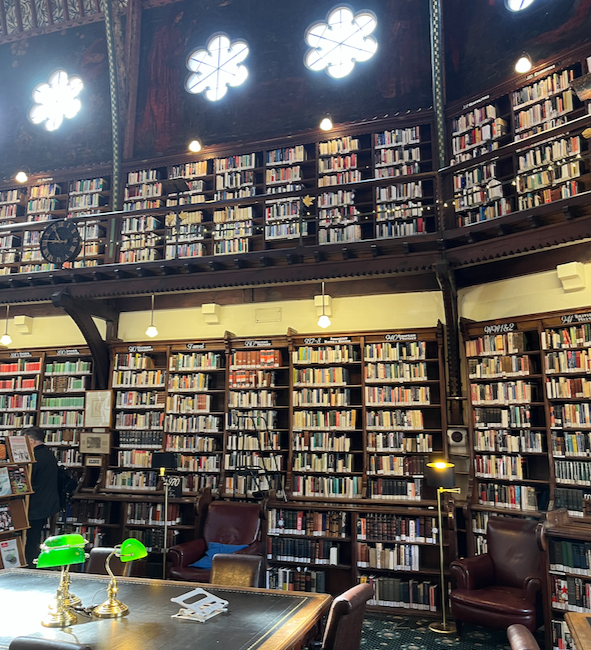Workaday White House Speechwriter vs. Credit-Hogging Dilettante Historian
March 06, 2023
Is it bad that historian Jon Meacham is feeding lines to President Biden? Former Obama speechwriter Sarada Peri says yes. I'm not so sure.
My old man used to say to his self-conscious teenagers, “You wouldn’t worry so much about what people thought of you if you realized how seldom they do.”
That came to mind when I read former President Obama speechwriter Sarada Peri’s Slate piece Friday, on now “annoying” professional speechwriters find it when the historian Jon Meacham indiscreetly or even perhaps somewhat boastfully lets leak his contributions to some of President Biden’s speeches.
On the list of most people’s problems, “annoyed speechwriters” ranks pretty low.
But as the executive director of the Professional Speechwriters Association, not low on mine.
So let’s see what’s got Peri perturbed.
“Why does this rankle those of us who do this for a living?” she asks rhetorically. “One reason is that Meacham seems to brazenly, almost reflexively, break the first rule of speechwriting: Don’t take credit. That’s the job. Speechwriters are, first and foremost, ghostwriters. The final product is a work of collaboration that ultimately belongs to the speaker. If you want credit for the speech, run for office. Deliver it yourself.”
That’s an old-school attitude that I respect, but don’t entirely subscribe to myself. I tend to think speechwriters should be exactly as quiet about their contribution as their client wants them to be and, as they think it benefits the public dialogue for them to be. I must say I was surprised at Peri’s strictness on this count, coming as she does from an Obama White House speechwriting office that has begotten several memoirs, most recently Obama chief speechwriter Cody Keenan’s deeply detailed blow-by-blow of the drafting of several important Obama speeches. Peri promoted that book enthusiastically when it came out last October, tweeting that it’s “a gripping, intimate look at life inside the White House.”
It seems to me Peri’s more genuine compliant about Meacham lies in this graph: “While some recent presidential speechwriters may have amassed an air of glamour, the life of a real presidential speechwriter—or any speechwriter, really—is rather workmanlike. It is grueling, often thankless work, vacillating wildly from dispiriting to exhilarating at any given moment. Which is why Meacham, gliding about Washington with an above-the-fray arrogance and the gumption to hoard credit, chafes.”
Well, OK, but Peri’s envy is not Meacham’s problem, is it? Just as it’s not Peri’s nor her fellow White House speechwriting alums’ fault that every non-White House speechwriter in the world has vastly less status than they do. Write three speeches in the West Wing, and you’re more in demand than someone who has written extensively for three Fortune 50 CEOs, a Governor and a Secretary of State. That’s nonsense, but it’s reality. And I’ve never heard a speechwriter complain about it.
I would say that speechwriters publicly complaining about their powerlessness and relative obscurity is not a good look, if I thought anyone other than speechwriters was actually looking. This is insider stuff, for speechwriting conferences, and hotel bars.
Hey: I agree that Jon Meacham is annoying. And I imagine that White House speechwriters resent his contributions. In my preview of the making of last month’s State of the Union Address, I quoted The New York Times on “the historian Jon Meacham, who is called upon to add historical heft, usually toward the end of the proceedings.” My comment: “Oh, brother.” What fun it must be to White House speechwriters who have been hammering away at the speech for months to have Meacham come in with a shovel of “historical heft.” I also can’t believe Meacham himself doesn’t see the absurdity in his commenting on the historical import of Biden presidential rhetoric that he himself helped write. As one speechwriter tells me, “Meacham should keep his mouth shut.” Yes, he should.
But ultimately, the only person whose feeling about all this that matters is Joe Biden, who doesn’t seem to lament Meacham’s loose lips. And I do understand why Biden might be leaning on Meacham for his special understanding of how oratory has influenced American history. Have you heard Meacham’s podcast, “It Was Said,” which breaks down famous speeches from history—by context, intent, execution and impact? Peri doesn’t mention it in her piece, but it’s pretty great, and it separates Meacham from other historians.
Peri’s broadest complaint is that Meacham’s “mawkish binary of history as a fight between our darker impulses and ‘the better angels of our nature’ doesn’t accurately describe the moment we’re in.” Perhaps not, but then President Biden—like his 45 predecessors—does not usually set out, in his speeches, to “accurately describe the moment we’re in.” He sets out to portray the current moment as a fight between our darker impulses and the better angels of our nature. And so it makes a lot of sense that he’s turning to a historian like Meacham for extra ammo.
And the speechwriters of the world? They’ll get over it. In fact, this is the first that many of them have heard about it.




This is a great inside-baseball discussion. Full of intricacies and subtleness that only a few appreciate and even fewer care about.
But I’ve always liked baseball (and speechwriting) so I found Peri’s article both informative and entertaining. A little “woe is me” perhaps. As you point out, it might be better shared in a bar where the drinks are long and the memories short. At the same time, there’s not a speechwriter anywhere who doesn’t also feel a bit of her pain and frustration.
Mostly, I think you’re on target here. On the other hand – and in the spirit of inside baseball fans everywhere – I do have a few thoughts.
Your view on a speechwriter’s discretion differs slightly from the PSA’s Code of Ethics. You wrote: “… speechwriters should be exactly as quiet about their contribution as their client wants them to be and, as they think it benefits the public dialogue for them to be.” The first part is reflective of the Code, but maybe not the second part. I’ve known you a long time, however, and my strong suspicion is that I’m swinging at semantic gnats with a Louisville Slugger.
Although Meachum isn’t a speechwriter, it would seem the spirit of the code should apply. It’s ill form for anyone advising the President – a general, member of the clergy, speechwriter, PR expert, New Age guru – to take credit for a specific line or specific perspective. At the end of the day, after all, these are the President’s thoughts, and the President needs to take credit (or blame).
Yes, that’s the old-school me. But – in line with the Boston mayor speechwriting fluff-up – I still believe it’s correct. Speechwriters should – especially in real-time – just do the job without any expectation of being publicly feted (or even heard from).
Your most powerful argument here, however, is one I can’t take exception to is: if speaker is ok with it, who am I to argue. It seems Meachum is, as the Code states, keeping matters as confidential as the client demands.
I do understand Peri’s frustration, though. I’ve been in those “men without pens” meetings – and, yes, they can sometimes make a speechwriter’s life difficult. Part of me is: So what? After nearly 30 years of doing the job, I realize that I don’t have the market cornered on wisdom. I like collaboration and the earlier the better.
The one thing I suspect many of us rail against is having a nearly final draft – that’s been run through the approval process – and then having someone do a flyby – without the proper context – to offer ‘helpful’ hints. It has the same elegance of a pigeon pooping on the new car you just drove off the lot and saying “See, isn’t that better?”
I’m not saying that happened here. I don’t know. But certainly, Peri shares the angst of many of us who suffer at the expense of mostly well-meaning after-the-fact ‘men without pens.’ By itself, that’s worthy of at least two rounds at the bar.
My final thought is about what a separation of time does for the discussion about public disclosure. There is a difference between real-time sharing versus a retrospective. Plenty of speechwriters – both public and corporate – have undertaken tell-all books AFTER the fact. Again, however, I think the Code of Ethics provides us guidance here and supports your point about how sharing the sausage-making process that is speechwriting benefits the public dialogue. The Code specifically states: Speechwriters keep matters involving clients as confidential as the clients demand and expect.
After leaving office, I don’t think the President should expect – or deserves to expect – the same kind of confidentiality someone in the private sector might get. We hold our public servants to a different standard and it’s constructive to understand how and why decisions were made. I think the term is situational ethics.
That was way more long-winded than I expected. And all I’ve had is coffee. Heaven help the speechwriter at the next conference who sidles up at the bar and asks, “So, what did you think of that Peri article?”
Buy me a drink, young’un, and let’s talk baseball! On second thought, make it a double and we’ll go extra innings.
Great comment, Fletch, don’t disagree with a word of it. And sharp eye on my bit about speechwriter disclosure. I added the bit about the public dialogue because I do think a speechwriter ought to think about that. Even if your client thinks it’s cool for you to film yourself writing his or her speech, you ought to think: Does a tour of the speechwriting sausage factory do the public conversation any good at all? Or does it in fact maybe do harm? Different for every situation, and maybe for every speechwriter; but I think I believe everyone should err on the side of discretion.